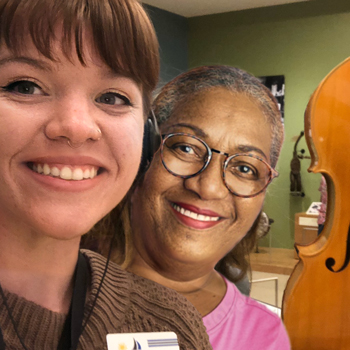Reigniting joy for your loved one—Relief for you!
Looking for enrichment opportunities for your loved one?
- Does your loved one seem bored or depressed?
- Are you concerned they aren’t getting enough one-on-one mental stimulation?
- Is dementia, disability, or difficulty communicating causing your family member to withdraw?
How about you?
- Are you worried about your loved one’s quality of life?
- Wish you could see your family member be more active?
- Do you feel guilty that you don’t have enough time for them?
- Do you live far away?
It may not seem possible now, but things truly can be different.
Contact Sage Care Management at 210-492-1224 to find out more about creative enrichment activities uniquely tailored to the needs and interests of your loved one.
Check out our success stories
How does Thoughtful Engagement work?
A Thoughtful Engagement Specialist comes to the home and interviews your loved one. They will separately interview you and possibly other family members by Zoom, telephone, or in person. Your specialist will thoughtfully piece together insights from the interviews and develop fun and engaging activities tailored to your relative’s interests.
From whimsical to active, indoors or out, cultural or practical, our personalized activities emphasize strengths and accommodate all levels of mobility, cognition, memory, and physical or mental health. Your loved one gets one-on-one attention and a strong social connection, while you get a break.
Start with a once-a-week visit and watch how the world opens up for the person you care for.
“Everyone deserves joy. Sometimes they just need help finding it.”
—Crystal Littlejohn, Founder of Thoughtful Engagement®
We specialize in working with people who have Alzheimer’s, Parkinson’s, or other neurological conditions. We also work with those who are isolated, depressed, or anxious, or whose world has simply gotten smaller.
Thoughtful Engagement is available for older adults living alone or with others. It can even serve as an individualized enrichment activity for those in assisted living or a memory care unit.
Let our Thoughtful Engagement program reignite joy for your loved one—Relief for you!
Give us a call at 210-492-1224.
Our success stories
Here are just a few of the ways Thoughtful Engagement has helped other families who were worried about an aging loved one:
Now she's happy to go out to a museum or the zoo. But that was not the case before. Ever since she had to retire due to moderate frontotemporal dementia, Maureen was withdrawn. Not herself. So her niece called Thoughtful Engagement. Diane's son, Joe, was diagnosed in his twenties with paranoid schizophrenia. At fifty he was living in a group home. He was generally stable but spent most of his time smoking and alone. Diane, now in her seventies, was experiencing health challenges. She worried about what would happen to Joe when she was gone. Chelsea was worried about her dad, Mark. He used to be so outgoing. But lately he refused to leave the house. It wasn’t COVID or dementia. He was simply too anxious. His dog, Maggie, held the key. When Peggy's husband died, she found it very difficult to go out in the world without him. She even quit going to church because it was too painful when people asked how she was doing. Her daughter, Debbie, lived far away and was extremely concerned because her mother had now lost not only her husband, but also her spiritual and social community. Roberto was a confirmed bachelor and beloved uncle to his many nieces and nephews. Always the life of the party at family barbeques, he had begun to withdraw. He no longer hung out with his buddies, and he was even losing weight. The family wasn’t sure what to do. James, a long distance son, was worried about his mother’s isolation and lack of mental stimulation following a series of minor strokes. Ruth had been a tenured professor of Art History, but had retreated since her husband’s death. She was becoming so withdrawn, it was difficult for James to have conversations with her on the phone. Sarah, a caregiving wife with health issues had a husband, Tom, who was prone to falling. She needed to go to her medical appointments, but her husband kept firing the caregivers she hired to stay with him. Reiko had always been a happy, talkative person. But four months after moving into an assisted living community, the staff confirmed that Reiko spent most of her time in her room. Her daughter, Sue, was concerned. This wasn’t like her mother. Sue also felt guilty because she had encouraged the move. Dave’s wife, Cindy, never got a moment to herself. Her energetic husband, Dave, had moderate dementia and demanded her attention all the time. He had even begun wandering. She was worried she couldn’t keep him at home much longer. Becoming social again
“What happens to him when I’m gone?”
Easing anxiety—one photo at a time
Adjusting to widowhood
Rockin’ and rollin’ out of depression
With a little help from Vincent
“I don’t need a sitter!”
Finding strength in memories
Horses give caregiving wife a break










